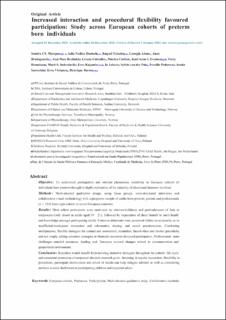| dc.contributor.author | Marques, Sandra CS. | |
| dc.contributor.author | Doetsch, Julia Nadine | |
| dc.contributor.author | Teixeira, Raquel | |
| dc.contributor.author | Abate, Georgia | |
| dc.contributor.author | Brødsgaard, Anne | |
| dc.contributor.author | Brubakk, Ann-Mari | |
| dc.contributor.author | Colombo, Grazia | |
| dc.contributor.author | Cuttini, Marina | |
| dc.contributor.author | Evensen, Kari Anne Indredavik | |
| dc.contributor.author | Hennissen, Vicky | |
| dc.contributor.author | Indredavik, Marit Sæbø | |
| dc.contributor.author | Kajantie, Eero Olavi | |
| dc.contributor.author | Lebeer, Jo | |
| dc.contributor.author | van der Pal, Sylvia | |
| dc.contributor.author | Pedersen, Pernille | |
| dc.contributor.author | Sarrechia, Iemke | |
| dc.contributor.author | Virtanen, Eeva | |
| dc.contributor.author | Barros, Henrique | |
| dc.date.accessioned | 2023-04-13T11:52:16Z | |
| dc.date.available | 2023-04-13T11:52:16Z | |
| dc.date.created | 2022-04-11T14:35:40Z | |
| dc.date.issued | 2022 | |
| dc.identifier.citation | Journal of Clinical Epidemiology. 2022, 143 169-177. | en_US |
| dc.identifier.issn | 0895-4356 | |
| dc.identifier.uri | https://hdl.handle.net/11250/3062897 | |
| dc.description.abstract | Objective
To understand participation and attrition phenomena variability in European cohorts of individuals born preterm through in-depth exploration of the interplay of situational elements involved.
Methods
Multi-situated qualitative design, using focus groups, semi-structured interviews and collaborative visual methodology with a purposive sample of adults born preterm, parents and professionals (n = 124) from eight cohorts in seven European countries.
Results
Most cohort participants were motivated by altruism/solidarity and gratitude/sense of duty to reciprocate (only absent in adults aged 19 – 21), followed by expectation of direct benefit to one's health and knowledge amongst participating adults. Common deterrents were perceived failure in reciprocity as in insufficient/inadequate interaction and information sharing, and postal questionnaires. Combining multipurpose, flexible strategies for contact and assessment, reminders, face-to-face and shorter periodicity and not simply adding retention strategies or financial incentives favoured participation. Professionals’ main challenges entailed resources, funding and, European societal changes related to communication and geopolitical environment.
Conclusion
Retention would benefit from tailoring inclusive strategies throughout the cohorts’ life cycle and consistent promotion of reciprocal altruistic research goals. Investing in regular interaction, flexibility in procedures, participant involvement and return of results can help mitigate attrition as well as considering mothers as main facilitators to participating children and impaired adults. | en_US |
| dc.language.iso | eng | en_US |
| dc.publisher | Elsevier | en_US |
| dc.rights | Attribution-NonCommercial-NoDerivatives 4.0 Internasjonal | * |
| dc.rights.uri | http://creativecommons.org/licenses/by-nc-nd/4.0/deed.no | * |
| dc.rights.uri | http://creativecommons.org/licenses/by-nc-nd/4.0/deed.no | |
| dc.title | Increased interaction and procedural flexibility favoured participation: Study across European cohorts of preterm born individuals | en_US |
| dc.title.alternative | Increased interaction and procedural flexibility favoured participation: Study across European cohorts of preterm born individuals | en_US |
| dc.type | Peer reviewed | en_US |
| dc.type | Journal article | en_US |
| dc.description.version | acceptedVersion | en_US |
| dc.subject.nsi | VDP::Helsefag: 800 | en_US |
| dc.subject.nsi | VDP::Health sciences: 800 | en_US |
| dc.source.pagenumber | 169-177 | en_US |
| dc.source.volume | 143 | en_US |
| dc.source.journal | Journal of Clinical Epidemiology | en_US |
| dc.identifier.doi | 10.1016/j.jclinepi.2021.12.027 | |
| dc.identifier.cristin | 2016783 | |
| dc.relation.project | EU – Horisont Europa (EC/HEU): Grant 733280 | en_US |
| dc.relation.project | Norges forskningsråd: 283791 | en_US |
| cristin.ispublished | true | |
| cristin.fulltext | original | |
| cristin.qualitycode | 2 | |

